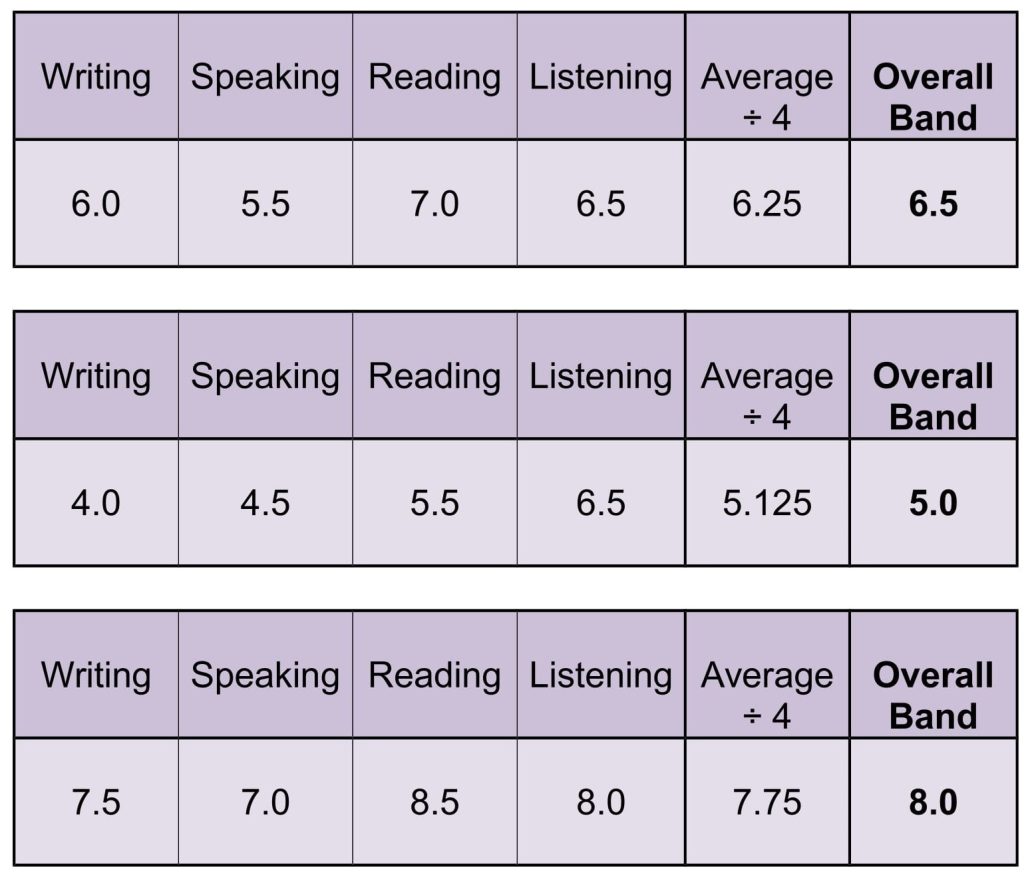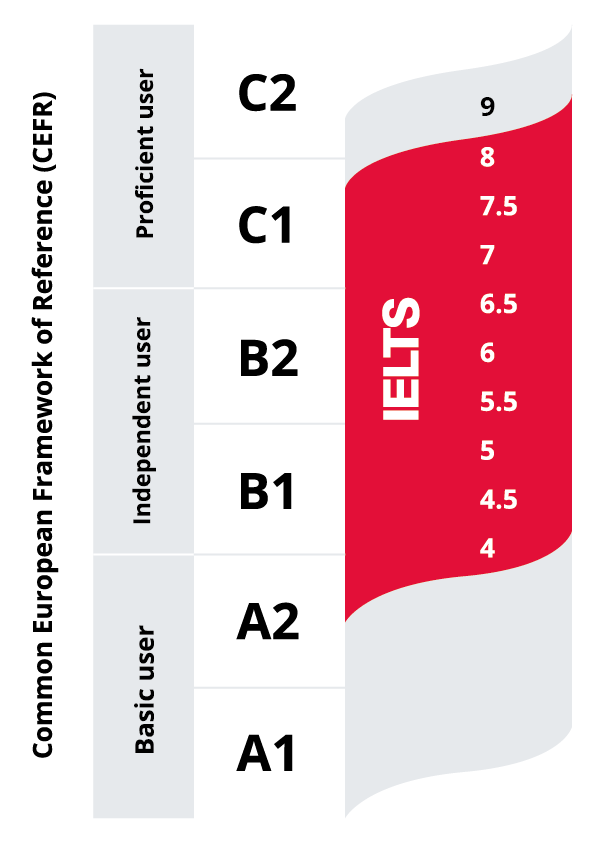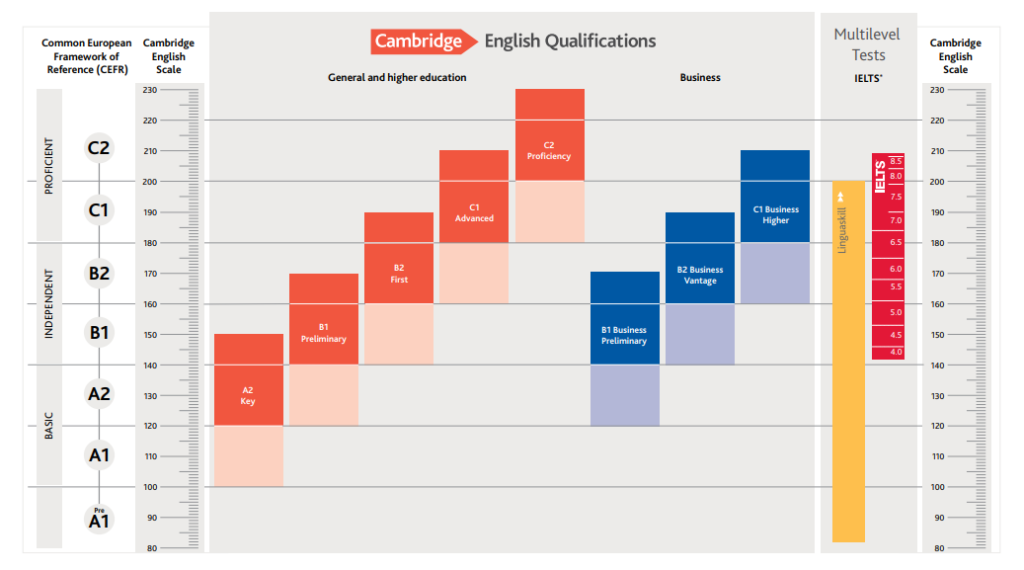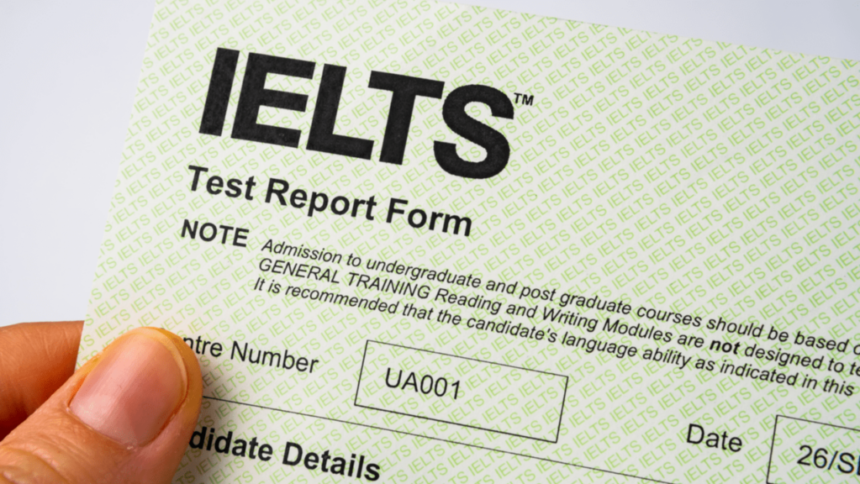If you’re a non-native English-speaking student applying to a foreign school, an IELTS test score is often required. However, understanding the scoring criteria and the level of English it represents can be confusing. This post not only clarifies “What Does Band 7 Mean in IELTS?” but also provides insights into the IELTS scoring criteria, English proficiency levels, and valuable tips for effective exam preparation.
How Are IELTS Overall Band Scores Calculated?
According to the Official IELTS Website, in the IELTS exam, the scores for Listening, Reading, Writing, and Speaking carry equal weight. They are graded on a scale of 0 to 9, with increments of 0.25, 0.5, and 0.75.
To determine the overall band score, the average of all four test components is taken. The final score is then rounded to the nearest half or whole band. For example, scores ending in .25 are rounded up to the next half band, while scores ending in .75 are rounded up to the next whole band.
Examples of IELTS Overall Band Score:

What Does IELTS Test Score Indicate?
IELTS scores indicate the level of English language proficiency of test takers. They provide an assessment of an individual’s abilities in listening, reading, writing, and speaking. These scores are widely recognized by educational institutions and organizations as a measure of language proficiency for academic and professional purposes.
The following table illustrates the skill level associated with each band score, indicating the proficiency of a student.
IELTS Band Scores Explained: 0 to 9
| Band score | Skill level | Description |
| Band 9 | Expert user | You have a full operational command of the language. Your use of English is appropriate, accurate and fluent, and you show complete understanding. |
| Band 8 | Very good user | You have a fully operational command of the language with only occasional unsystematic inaccuracies and inappropriate usage. You may misunderstand some things in unfamiliar situations. You handle complex detailed argumentation well. |
| Band 7 | Good user | You have an operational command of the language, though with occasional inaccuracies, inappropriate usage and misunderstandings in some situations. Generally you handle complex language well and understand detailed reasoning. |
| Band 6 | Competent user | Generally you have an effective command of the language despite some inaccuracies, inappropriate usage and misunderstandings. You can use and understand fairly complex language, particularly in familiar situations. |
| Band 5 | Modest user | You have a partial command of the language, and cope with overall meaning in most situations, although you are likely to make many mistakes. You should be able to handle basic communication in your own field. |
| Band 4 | Limited user | Your basic competence is limited to familiar situations. You frequently show problems in understanding and expression. You are not able to use complex language. |
| Band 3 | Extremely limited user | You convey and understand only general meaning in very familiar situations. There are frequent breakdowns in communication. |
| Band 2 | Intermittent user | You have great difficulty understanding spoken and written English. |
| Band 1 | Non-user | You have no ability to use the language except a few isolated words. |
| Band 0 | Did not attempt the test | You did not answer the questions. |
Section Band Scores in IELTS Tests
IELTS Listening Score
There are 40 questions in the IELTS Listening test. Each correct answer is awarded 1 mark.
| IELTS Listening Score | |
|---|---|
| Correct Answer | Band Score |
| 40-39 | 9 |
| 38-37 | 8.5 |
| 36-35 | 8 |
| 34-32 | 7.5 |
| 31-30 | 7 |
| 29-26 | 6.5 |
| 25-23 | 6 |
| 22-18 | 5.5 |
| 17-16 | 5 |
| 15-13 | 4.5 |
| 12-11 | 4 |
IELTS Reading Score
IELTS Reading test has two types, IELTS Academic Reading test and General Training Reading test. However, test scale is the same for both. There are 40 questions and each correct answer gives 1 mark.
| IELTS Reading Score (Academic Reading) | |
|---|---|
| Correct Answer | Band Score |
| 40-39 | 9 |
| 38-37 | 8.5 |
| 36-35 | 8 |
| 34-33 | 7.5 |
| 32-30 | 7 |
| 29-27 | 6.5 |
| 26-23 | 6 |
| 22-19 | 5.5 |
| 18-15 | 5 |
| 14-13 | 4.5 |
| 12-10 | 4 |
| 9-8 | 3.5 |
| 7-6 | 3 |
| 5-4 | 2.5 |
| IELTS Reading Score (General Training Reading) | |
|---|---|
| Correct Answer | Band Score |
| 40 | 9 |
| 39 | 8.5 |
| 38-37 | 8 |
| 36 | 7.5 |
| 35-34 | 7 |
| 33-32 | 6.5 |
| 31-30 | 6 |
| 29-27 | 5.5 |
| 26-23 | 5 |
| 22-19 | 4.5 |
| 18-15 | 4 |
| 14-12 | 3.5 |
| 11-9 | 3 |
| 8-6 | 2.5 |
IELTS Writing Score
There are four criteria for awarding a score on IELTS Writing Test. The weight of each criterion is equal, each accounting for 25%.
- Task Achievement (for task 1) / Task Response (for task 2) = 25%
- Coherence & Cohesion = 25%
- Lexical Resource = 25%
- Grammatical Range & Accuracy = 25%
IELTS Speaking Score
IELTS Speaking test also has four criteria with same weight. More details are as below. There is only one type of IELTS Speaking test, no distinction on Academic and General Training.
- Fluency & Coherence = 25%
- Lexical Resource = 25%
- Grammatical Range & Accuracy = 25%
- Pronunciation = 25%
Is 7 A Good Score in IELTS?
Scoring a 7 in IELTS is generally considered good, especially since 9 is the highest score. However, the perception of a good score depends on the purpose of taking the exam. For immigration and work visas, a minimum score of 6 is often required in all components. Some universities may also demand a score of 6 for academic study. Scoring an 8 or 9 is relatively rare, with 7 being a commendable achievement.
Is Band 7 in IELTS High Enough for Universities?
Absolutely! An overall band score of 7 in the IELTS test is generally enough for applying to most universities worldwide. However, certain programmes may have higher score requirements. For instance, prestigious UK universities like Oxford and UCL often require a band score of 7.5 for most programmes.
It’s important to note that some universities also have minimum requirements for individual test components. While a band 7 may meet the criteria for many schools, it’s advisable to check the specific requirements to ensure you meet all the necessary criteria.
Is It Hard to Get 7 in the IELTS?
Achieving a score of 7 in the IELTS test, particularly in the production skills of Writing and Speaking, can be challenging. Many candidates face difficulty in making the leap from 6.5 to 7. A higher level of control over sentence structures, a wider range of vocabulary, coherent topic development, and a flowing writing style are crucial for reaching the 7.0 threshold. In addition, punctuation, spelling, and the elimination of habitual error patterns become more important at this level. Even proficient English speakers may find their scores limited by these factors in the Speaking and Writing sections, despite effective communication in daily usage.
How to Get Band 7 in IELTS?
Here are some tips to help you achieve a Band 7 in IELTS:
Expand your vocabulary
Learn and use a wide range of words and phrases related to different topics. For instance, instead of using basic adjectives like “good” or “bad,” explore more descriptive alternatives like “excellent,” “remarkable,” “dreadful,” or “disastrous.”
Take advantage of online resources
Utilize websites, mobile apps, and YouTube channels dedicated to IELTS preparation. They often offer practice exercises, sample questions, and expert tips to help you improve your skills.
Enhance grammar skills
Practice using complex sentence structures, such as subordinate clauses and relative clauses, to showcase your grammatical range. For example, instead of a simple sentence like “I like to read books,” try “Reading books is a pastime that I thoroughly enjoy.”
Structure your writing effectively
Use a clear introduction, body paragraphs with supporting evidence, and a concise conclusion in your essays. For example, in an opinion essay, state your viewpoint in the introduction, provide reasons and examples in the body, and summarize your opinion in the conclusion.
Improve reading comprehension
Read a variety of texts, such as newspaper articles, academic journals, and fiction, to expose yourself to different writing styles and vocabulary. Practice summarizing the main points and identifying supporting details.
Enhance listening skills
Listen to a range of audio materials, such as TED Talks, podcasts, or news broadcasts, to improve your listening comprehension. Take note of keywords and practice predicting answers based on context.
Develop fluency in speaking
Engage in regular conversations with English speakers or language exchange partners to improve your fluency. Practice expressing your thoughts and opinions on various topics, using appropriate intonation and natural speech patterns.
Time management
Practice completing IELTS tasks within the given time limits. For example, allocate specific time slots for reading and answering questions, writing essays, and speaking responses during your practice sessions.
Get feedback
Seek feedback from a qualified IELTS tutor or use online writing correction services to receive personalized suggestions for improvement. Identify areas where you can enhance your performance and focus on addressing those.
How to Align the IELTS Test Score with the CEFR (Common European Framework of Reference) Level?
The CEFR is an international standard that measures language ability on a scale from A1 to C2. The highest CEFR level in IELTS is band 9. By mapping IELTS scores against this framework, you can help students assess their language ability, while also enabling teachers and examiners to compare IELTS skills with other language tests and qualifications.


Conclusion
In summary, achieving a Band 7 in IELTS is a significant accomplishment! It demonstrates a high level of language proficiency, including strong communication skills, a wide range of vocabulary, and good grammar. If achieving this IELTS score is your goal, it’s time to start working diligently towards it. A strong IELTS score opens up more opportunities when applying to schools. So, buckle down and give it your all to increase your chances of success.
If you’re thinking about studying in the UK, it’s crucial to find the right student accommodation. That’s where uhomes.com comes in. It’s a reliable platform that helps students like you find the perfect place to live in London, Manchester, Nottingham, Newcastle, Leeds and many other cities.

Understanding IELTS Test Score FAQ
What does IELTS stand for?
IELTS stands for the International English Language Testing System.
What is the purpose of the IELTS test?
The IELTS test is designed to assess the English language proficiency of individuals who plan to study, work, or migrate to English-speaking countries.
How many types of IELTS tests are there?
There are two types of IELTS tests: IELTS Academic and IELTS General Training. The Academic module is intended for those applying to study at universities or higher education institutions, while the General Training module is for individuals seeking employment or immigration purposes.
How can I prepare for the IELTS test?
There are various ways to prepare for the IELTS test, including self-study using preparation books and online resources, attending test preparation courses, practicing sample questions, and taking mock exams.
How long does it take to recceive my IELTS score?
The specific time depends on the test that you take:
- If you take IELTS Online, it needs 6-8 days.
- For taking IELTS on Computer, within only 1-5 days you will receive you results.
- It takes up to 13 days if you take IELTS on Paper.
- IELTS for UK Visas and Immigration (UKVI) takes up to 13 days to receive IELTS score.
- Taking IELTS for UKVI Life Skills test can get the result up to 7 days.
How long is my IELTS score valid?
IELTS score is valid for two years after taking a test. The time range is set based on researches about second-language loss.








